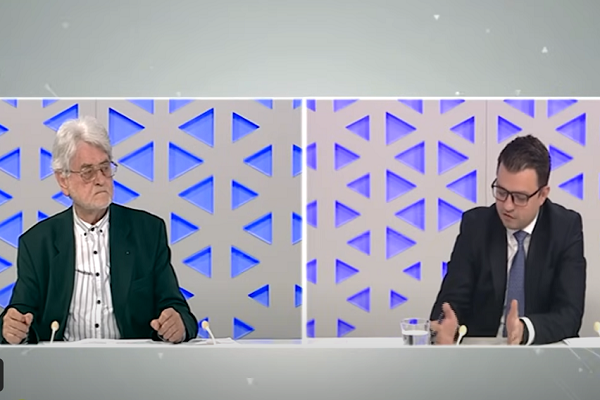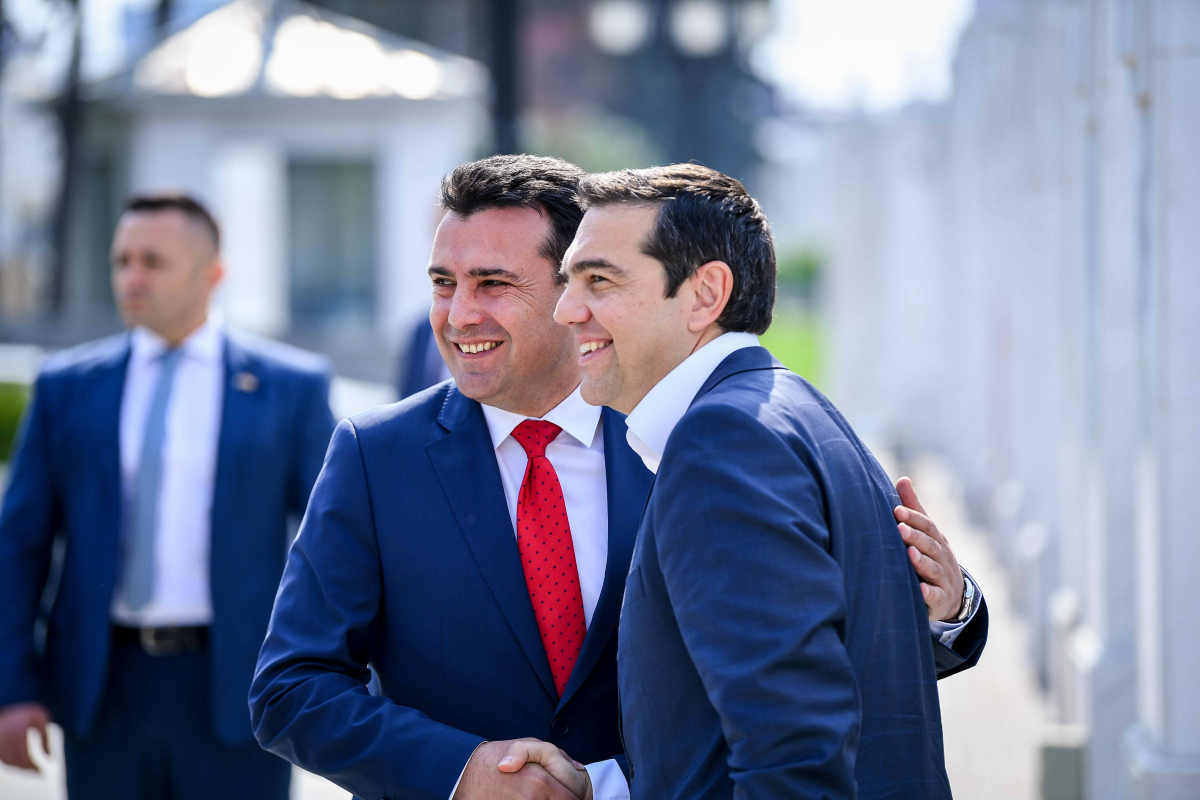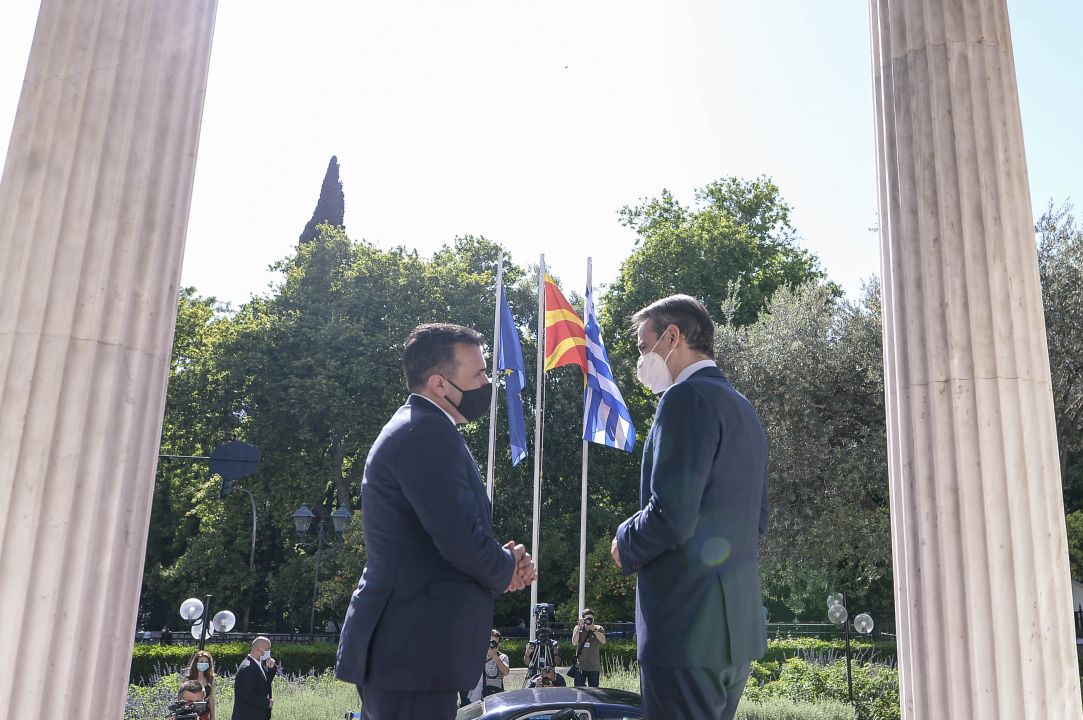The public in North Macedonia is stunned by the recent debate regarding the legal framework of four strategic investments in the energy sector worth approximately 800 million euros, not by its merit, but by the merit of the Government. Investment intentions were expressed by the Government back in 2021 and 2022 and such intentions were implemented through a public call and a decision assigning the status of a strategic investor. The second half of 2022 and the whole of 2023 passed, however, without a word of a public announcement or activity regarding these investments, so at the end of January 2024 Kovachevski’s Government, in its very last days, submitted to Parliament a request for them to be adopted in a fast-track procedure. This fact alone provides sufficient grounds for suspicion about the intentions of the proposer, seeking the contracts and the appropriate laws to be passed without a question asked, writes Truthmeter.mk.
Under the content-sharing agreement between Truthmeter.mk and Meta.mk, we republish the text below:
By analyzing just one of the four foreign strategic investments in the energy sector worth approximately 800 million euros, a conclusion can be derived that several elements are – to put it mildly – unusual and competent institutions have not responded to the request so far i.e., the Government as the proposer to the Parliament, which needs to approve the contracts through appropriate separate laws for each of them.
Firstly, the decision for one of the four largest investments in building a cogeneration plant in Skopje by the Greek company Mytilineos was adopted a few years before the submission of the law in the Parliament, and even a year before the opening of the public call which has now just been formalized at the end of the Government’s term, and secondly, since the formal approval by the Government, the investment became more expensive by 80 million Euros.
The public, however, was more widely informed only after the Deputy Prime Minister in Charge of Economic Affairs, Fatmir Bytyqi, announced that the draft laws entered the Parliament last week and that they were scheduled for discussion on 07.02. The draft laws (from point 28 to 31), are accompanied by attachments, including the contracts that need to be signed by Government representatives once the laws are passed. As examples, one can see documentation on Mytilineos and on Soncheva Elektrana (Sun Powerplant) in Pehchevo.
Right after Bytyqi’s announcement, the first responses followed, above all, from the Association of Engineers, which was quite vocal about the detrimental and unsuccessful contract for constructing HEC Chebren by the Greek state-owned company PPC-Acrhirodon towards the end of 2023. Due to the fact that members of this Association are active and retired university professors in the country, its voice is regarded as expert opinion and is quite specific in the public debate, i.e., it cannot be ignored and must be checked out. Professor Dejan Trajkovski from the Faculty of Technology in Bitola was most specific with his analysis of the co-generation plant contract, including energy prices.
Many key issues and doubts
Amongst the many suspicions publicly imposed issues by these experts were the following key ones: is the cost of Mytilineos’ investment realistic or the amount of 290 million euros is inflated, is the contract detrimental by the sheer fact that the country is obliged to purchase electricity and heating energy for 20 years, or did the commissioning party – Government – manage to incorporate favourable equations and formulae that will make the production or selling price less expensive than the stock exchange price, is the quantity of electrical (1.150 GWh per annum) and heating energy (270 GW) so large, especially the heating energy, that lacks absorption capacity but needs to be paid, does the country really lack funds to build the plant itself because it spent 400 million euros on subsidizing the electricity bills of the citizens (F. Bytyqi), or is the Government reluctant to secure funds to build these and similar facilities on its own from other lucrative reasons that are not explained, can the land awarded to Mytilineos be acquired, is the fact that the country is relinquishing national courts for all disputable issues and agrees to a foreign arbitration good or bad thereby accepting to enforce the decision of the arbitrary court, is it true that the obligation to help Mytilineos with 50 million euros imposes, in fact, a loss for the country or is it true that the same amount, even more, is received by other foreign investors in the country, is it true that within 30 years the profit itself will be more than a billion Euros, while the loan for the construction will be paid off from the extremely expensive energy sold by Mytilineos to ESM that is obliged to buy it whether it needs it or not, is it true that the price of heating energy is expected to drop by 40 percent due to the prices that Mytilineos will be selling it or is this just a spin on the part of the Government since even now the price of gas on the stock exchange is much lower than that recognized by RKE (REC) etc…
There are many other issues and suspicions that are imposed on the public as expert opinions, on the one side, while the Government, on the other side, is verbally denying most of the claims and communicating the exact opposite.
One government opinion – that seems like a spin – is, for example, that of Deputy Prime Minister Bytyqi that the country does not have its own funds because it spent 400 million euros for subsidizing the bills of the citizens in the last two years. All economic parameters and the credit rating of the country, however, indicate that it will not be a problem to secure something more than a 200 million Euros favorable loan to build the power plant itself through the state-owned ESM. Nevertheless, this project would be commercial, and it would raise its own revenue making it viable for a loan, especially with collateral secured by the state.
The other issue – that can be answered only by experts – is whether the Mytilineos approach to setting the price of produced energy on the price of natural gas on the Dutch stock exchange for 20 years is a good one, bearing in mind that the day before yesterday, for example, the price was only 28 Euro per cubic meter. This is the key argument for claiming that the price of electricity and heating will be cheaper than the Hypex Stock Exchange, for example, as offered by Viktor Andonov, one of the main advisers of the Government and the former Prime-minister Dimitar Kovachevski.

The first thing that comes to mind to those with long memories is the formula that Hellenic Petroleum, via OKTA, was using for setting fuel prices in Macedonia up to 2019, i.e., the reference price being the price of Brent oil on global stock exchanges (most expensive because it is of the best quality), although from the very beginning of the agreement after the year 2000 it was well known that Hellenic frequently used Russian oil for producing its derivates, oil and diesel. One needs to mention that in the television debate, Andonov confirmed that Mytilineos will produce its energy from Russian oil because the company had a 10-year exclusive contract for imports of Gazprom gas. All this can be viewed in the recent debate show “Otvoreno” on Televizija 24 Vesti, where Andonov claimed that the Association of Engineers was spreading disinformation.
Mytilineos was announced back in 2019
One can find a rich archive online with the background of Mytlineos’ establishment as a strategic investor in Skopje.
In October 2022, the media informed us about the decision of the Government to proclaim Mytlineos as a strategic investor, and, amazingly, some of the figures do not correspond with today’s numbers.
“The value of the investment is estimated at 211 million Euros, and according to the provision, it consists of a power plant (with a capacity of 90-105 Megawatts) and heating energy (with a capacity of 135-150 Megawatts). The annual power production is expected to be approximately 1150 Gigawatts and around 275 Gigawatts heating energy, that would have to be supplied to the appropriate energy systems – MEPSO and the heating system of the City of Skopje”, informed the Government in its 89 session.
How the 211 million euros became 290 million when the capacity and the produced quantity remained the same as those that will be, supposedly, discussed by the Members of Parliament, is not known to date.
This formal decision was reached in October 2022. However, the unformal decision for Mytilineos seems to have been agreed back in 2019 during the visit of the Greek Prime-minister, Alexis Tsipras with a large delegation of Greek businessmen in Skopje. Announcing the visit, the Prime Minister at the time, Zoran Zaev, who signed the Prespa Agreement together with Tsipras in 2018, for France Press mentioned that big Greek companies with billions in annual revenue were coming to Skopje, thereby explicitly citing Motor Oil and Mytilineos. The visit took place in the beginning of April 2019 with more than 120 Greek entrepreneurs visiting Skopje.

Approximately 400 businessmen from both countries are participating on the Forum. The Greek Prime-minister is accompanied by a delegation of more than 140 executives and representatives from over a hundred small and medium-sized enterprises that will take part in the Business Forum, including “Mytilineos Group”, “Intracom”, “Motor Oil”, “Prometheus Gas”, “GEK Terna”, “Hellenic Petroleum”, “Aktor”, “Apivita”, “PPC”, DESFA, TITAN, “Viohalco”, “Sidenor SA”, “Alfa Digital”, “Alumil SA”, “Malamatinas & Son SA”, “Ohonos Snack SA”, reported RFE in its article about the visit of Tsipras and the Business Forum thereof.
Both leaders announced cooperation in the energy, infrastructure, and transport sectors, and increased trade exchange, RFE informs.
In September of that year in New York, Zaev met the new Greek Prime Minister, Kyriakos Mitsotakis for the first time. The following September (2020) he met Mitsotakis on a business conference in Athens, while in March 2021 he specifically announced the Mytilineos investment:
“We are not stopping here. We have six new energy investments, including Mytilineos’ intention to build a gas plant in the country”, said Zaev in an interview for Sloboden Pecat, as reported by Struja.mk.

In the beginning of May 2021, Zaev had a working meeting with Mitsotakis in Athens where he participated on the Delphi Forum. According to specialized energy media, he announced the Mytilineos investment even then. A week later, Mytilineos carefully informed that ”it is thinking of investing in gas-plants in Bulgaria and in North Macedonia”.
At the beginning of 2022, the Government published a call for strategic investors. In May Mytilineos registered a daughter company in Skopje and submitted a request to become a strategic investor on 26 May. The decision was made on 10 October. This is apparent from both the media and the Decision of the Government. What can also be seen is who else applied on the call and which Commission made the decision about the winner.
Why fast procedure – No one is explaining
The public is stunned by the recent debate regarding the legal framework of four strategic investments in the energy sector worth approximately 800 million euros, not by its own merit, but by the merit of the Government. One can see from the other strategic investment decisions in the energy sector that intentions were expressed, public call published, and governmental decisions made back in 2021. Until October 2022, everything was implemented. The second half of 2022 and 2023 went by, however, without a word of a public announcement or activity regarding these investments. Therefore, at the end of January 2024, Kovachevski’s Government, in its very last days, submitted to Parliament a request for the adoption of these laws in a fast procedure. This fact alone provides sufficient ground for suspicion about the intentions of the proposer, seeking the contracts and the appropriate laws to be passed without a question asked.
Apart from the fact that the Government was many times criticized by the EU for exploiting the fast track, urgent procedure by applying the European flag even when the acquis was not concerned, under the circumstances the use of a regular procedure would be a requirement this time. Each law, especially each of the contracts made for these strategic investments, is sizeable, with a great deal of professional terminology, while the suspicions and doubts of the public are also great. The greatest suspicion of all is created by insisting upon the use of the “fast-track procedure” that seems like concealing possible responsibility on the shoulders of the obeying Members of Parliament, who, as a reminder, cannot be prosecuted for the decisions made within the Parliament. Fast-track procedure for such enormous amounts for constructing key energy infrastructure always “smells” of corruption.
***
P.S.
Latest news from the press conference of the Minister of Economy Kreshnik Bekteshi on 9 February, after the publishing of this text confirm that there is really something foulsome in this investment of Mytilineos.
Author: Teofil Blazhevski




















![Young people in a three-day-workshop learned about data visualization [Gallery]](https://meta.mk/wp-content/uploads/2023/12/obuka-za-vizuelizacija-na-podatoci-vo-dekemvri-2023--100x70.jpg)




